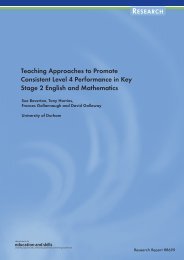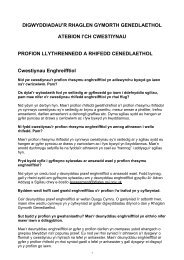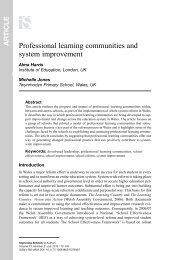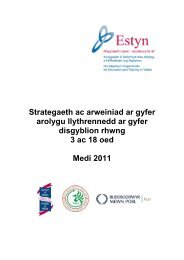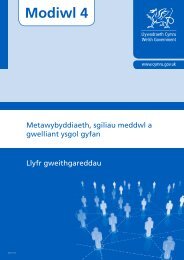Improving schools: full plan - Learning Wales - Welsh Government
Improving schools: full plan - Learning Wales - Welsh Government
Improving schools: full plan - Learning Wales - Welsh Government
Create successful ePaper yourself
Turn your PDF publications into a flip-book with our unique Google optimized e-Paper software.
ResourcesTwenty out of the 22 local authorities achieved the 80 per cent delegation target by 2012and the average total gross <strong>schools</strong> budgeted expenditure delegated directly to <strong>schools</strong> in2012–13 was 81 per cent. This amounts to £2.021 billion, an increase from the previous yearof £135 million.The <strong>Welsh</strong> <strong>Government</strong> has protected education budgets and provided an uplift ofone per cent per annum. This protection has been extended into 2014–15 with anadditional £80 million per annum for <strong>schools</strong> by 2014–15 compared to the 2010–11local government settlement.<strong>Welsh</strong> <strong>Government</strong> Revenue funding of education in <strong>Wales</strong> can be broken down in thefollowing way for the 2012–13 financial year.• The total <strong>Welsh</strong> <strong>Government</strong> funding for Education and Skills is £1.675 billion.• A further £2.202 billion is identified within the local government settlement for education.• The current funding for the School Effectiveness Grant is £25.5 million, and the PupilDeprevation Grant (PDG) £32.4 million.The level of surplus places in <strong>schools</strong> across <strong>Wales</strong> remains a significant challenge. Managingthe provision of school places rests with local authorities through the removal of surplusplaces (principally by school re-organisation and closure), the dedication of surplus capacity toother suitable purposes and through the admissions system (by the adjustment of catchmentareas to reduce over-subscription at popular <strong>schools</strong>). There is a similar range of opportunitiesavailable to local authorities where demand requires the development of additional provision,but given the overall over-supply of school places, the principal concern of a number of localauthorities in <strong>Wales</strong> in the forthcoming years will be on reducing surplus places. In order toassist local authorities and other proposers, three complementary programmes of work areunderway, focusing on:• making the system for school re-organisation more streamlined and more locally-focused• helping local authorities to think more creatively about the use of their surplus estate• encouraging local authorities to review school catchment areas, supported by thedevelopment of revised codes of practice on admissions and admissions appeals.The School Standards and Organisation (<strong>Wales</strong>) Bill (2012) will transfer the responsibility fordetermining school organisation proposals in most cases to either the proposer or to new,locally-based panels. At the same time stringent new requirements on proposers, modelledon best practice, on how to go about developing and consulting on school reorganisationproposals will be introduced. Local authorities will need to demonstrate to their localcommunities that proposals are efficient, and will deliver benefits: to do this effectively theywill need to indentify and draw upon the most effective models for school organisation.40 <strong>Improving</strong> <strong>schools</strong>




